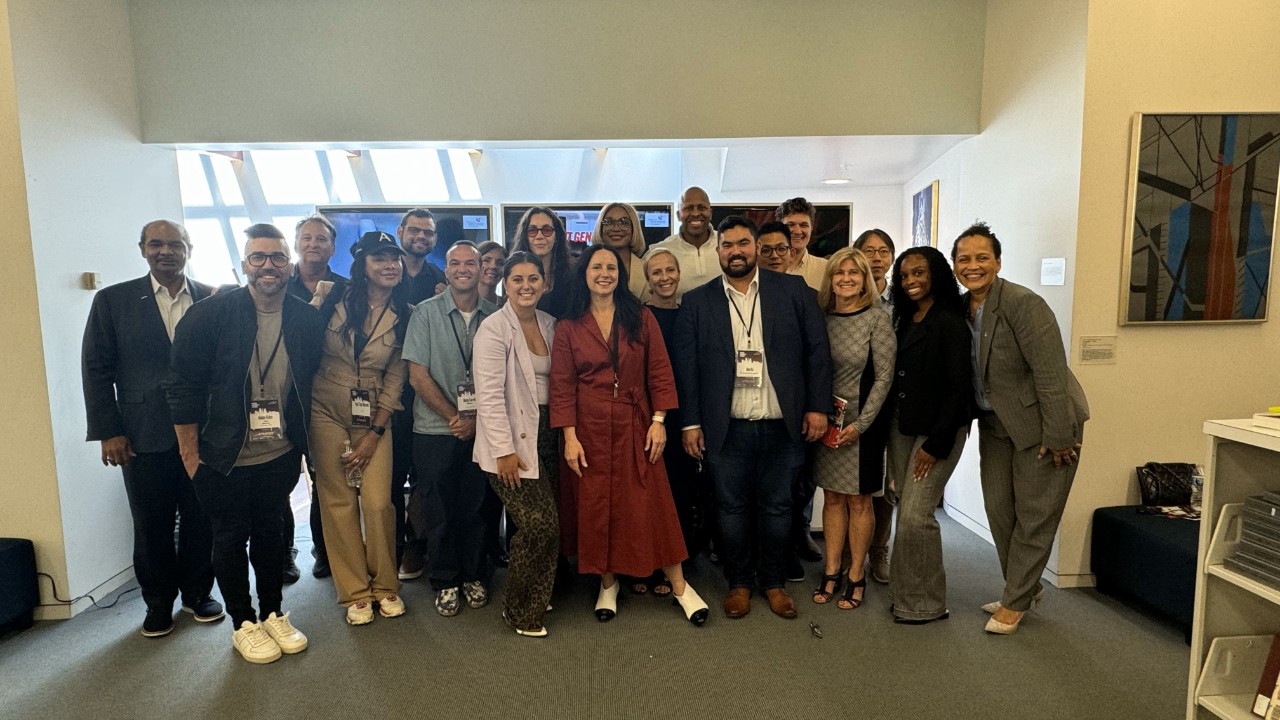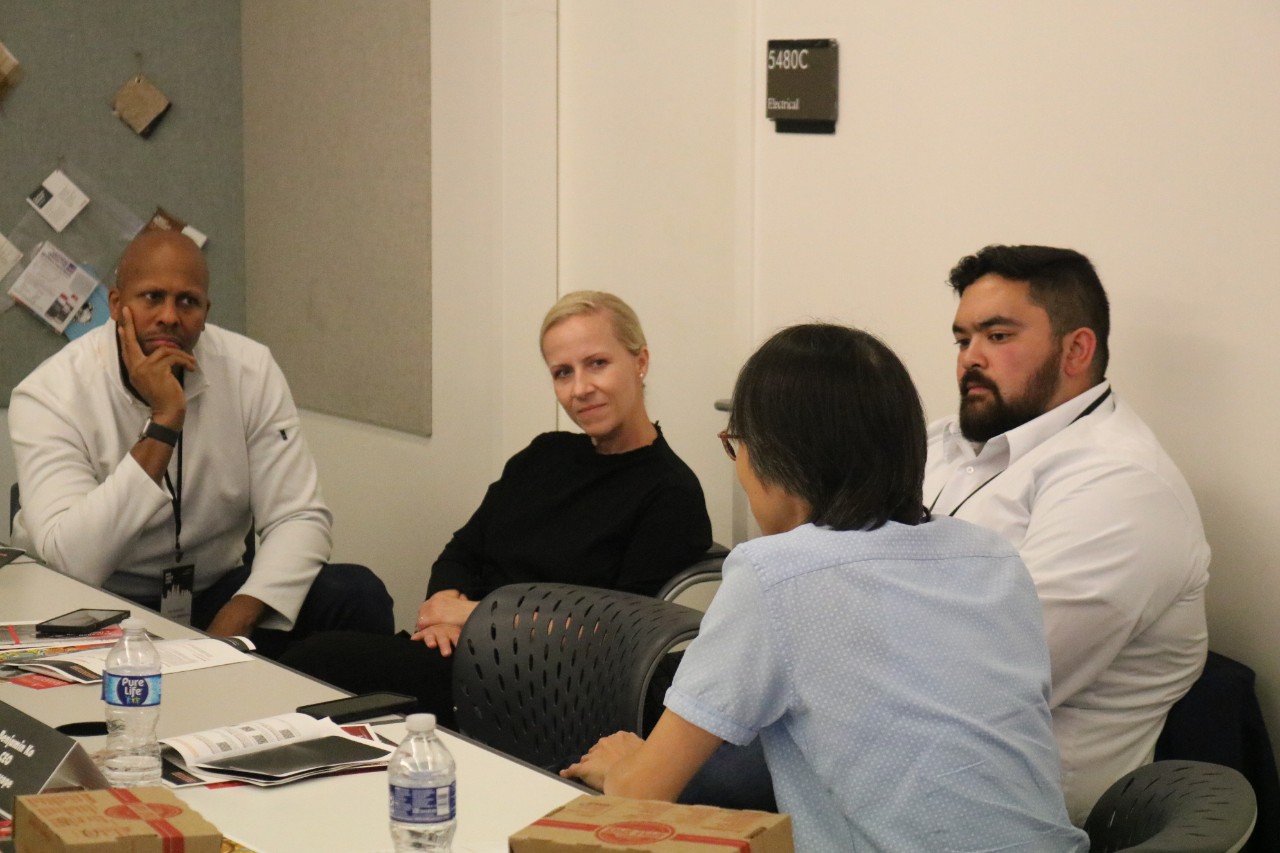
UC workshop shows AI alone cannot best human input
DAAP and private industry agree that AI needs the creative disciplines for responsible applications
There’s a line in multiple “Spider-Man” movies that information technologists like to quote when referring to artificial intelligence (AI): “With great power comes great responsibility.”
On Sept. 5, industry leaders and academics focused on the future and power of AI in the creative disciplines — with the underpinnings of human creativity in mind — at a workshop, “Creativity and AI,” held at the University of Cincinnati’s College of Design, Architecture, Art, and Planning (DAAP).

The "Creativity and AI" workshop being led by Claudia Rebola, UC professor and DAAP’s associate dean for research and graduate programs. Photo/Delfina Lassalle, DAAP graduate student
The workshop was an extension of MidwestCon 2024, a tech expo and hackathon hosted by the UC Crypto Club, in collaboration with Rob Richardson, founder of Disrupt Now, chief curator of MidwestCon and a startup partner at the UC 1819 Innovation Hub.
“AI technology is a tool to help augment [creativity] but it's not a replacement for creativity,” Richardson stated to open the workshop, which was organized and led by Claudia Rebola, UC professor and DAAP’s associate dean for research and graduate programs.
Rebola’s intent was to bring industry professionals and academics together to learn, connect, innovate and strategize the future of AI as it relates to design, architecture, art and planning — the four schools within DAAP.
“We at DAAP are having critical conversations about AI, engaging in intentional conversations to shape the future of AI in the creative disciplines and preparing our students to be responsible agents of change in industry.”

Small group breakout session for "Creativity and AI". Photo/Delfina Lassalle, DAAP graduate student.
Attendees brainstormed after breaking into groups focused on technical skills, creative skills, theoretical skills and business skills. The consensus in all areas was that AI is a tool, a medium that cannot be used in place of critical thinking or human interaction.
“AI can get us part way there,” by modeling the probable based on the AI data collected, but a balance of human input is necessary, said Benjamin Ko, CEO of Kaleidoscope Innovation, a Cincinnati-based product design and development firm.
An example of the limitations of AI, Ko explained, would be to ask AI to model the experiences of a supermarket shopper to determine a marketing/advertising strategy. The AI data, he said, will be lacking because, “AI cannot give you a true lived experience.”
In this scenario, Rebola later commented, the balance of AI data with the nuance of human thinking would be particularly important to DAAP students, who design logos, products, services and environments from user input.

Robert Gordon, senior strategic leader for AI and digital innovation at DSS, Inc. Photo/Delfina Lassalle, DAAP graduate student
“In order to effectively use AI as a student, and later in the workforce, you can't just take everything that you get from these machines at face value,” she said.
The workshop ended with the concurrence that the creative disciplines are necessary to keep AI from churning out a rote, unimaginative product. It was determined that in these disciplines, AI is merely a tool much like the pencil and protractor evolved into computer design programs. The creative disciplines with its user-centered methods can help steer AI in ethical, empathic and responsible futures.
“In my view, creatives will be essential to how society now takes hold of this new technology and makes it into something that is meaningful and move society forward,” remarked attendee Robert Gordon, senior strategic leader for AI and digital innovation at DSS, Inc., a leading provider of health information technology solutions for federal, private and public health care organizations.
Featured image by Delfina Lassalle/DAAP graduate student.
Impact Lives Here
The University of Cincinnati is leading public urban universities into a new era of innovation and impact. Our faculty, staff and students are saving lives, changing outcomes and bending the future in our city's direction. Next Lives Here.
Related Stories
UC workshop shows AI alone cannot best human input
September 11, 2024
As AI starts to permeate industry, how will those in the creative fields adapt? A workshop hosted by UC’s College of Design, Architecture, Art, and Planning (DAAP) brought industry and academics together to discuss the future of AI and how creative disciplines benefit.
UC’s chief innovation and strategy officer pens article on AI and ChatGPT
May 24, 2023
Good technologies make ripples, but great technologies make ruptures, University of Cincinnati Chief Innovation & Strategy Officer Ryan Hays wrote.
Bearcats in business: Ryan Rosensweig, Microsoft
September 4, 2024
Ryan Rosensweig’s journey from the University of Cincinnati to Microsoft is filled with innovative impacts, co-op opportunities and mentorship from Bearcat professors.
